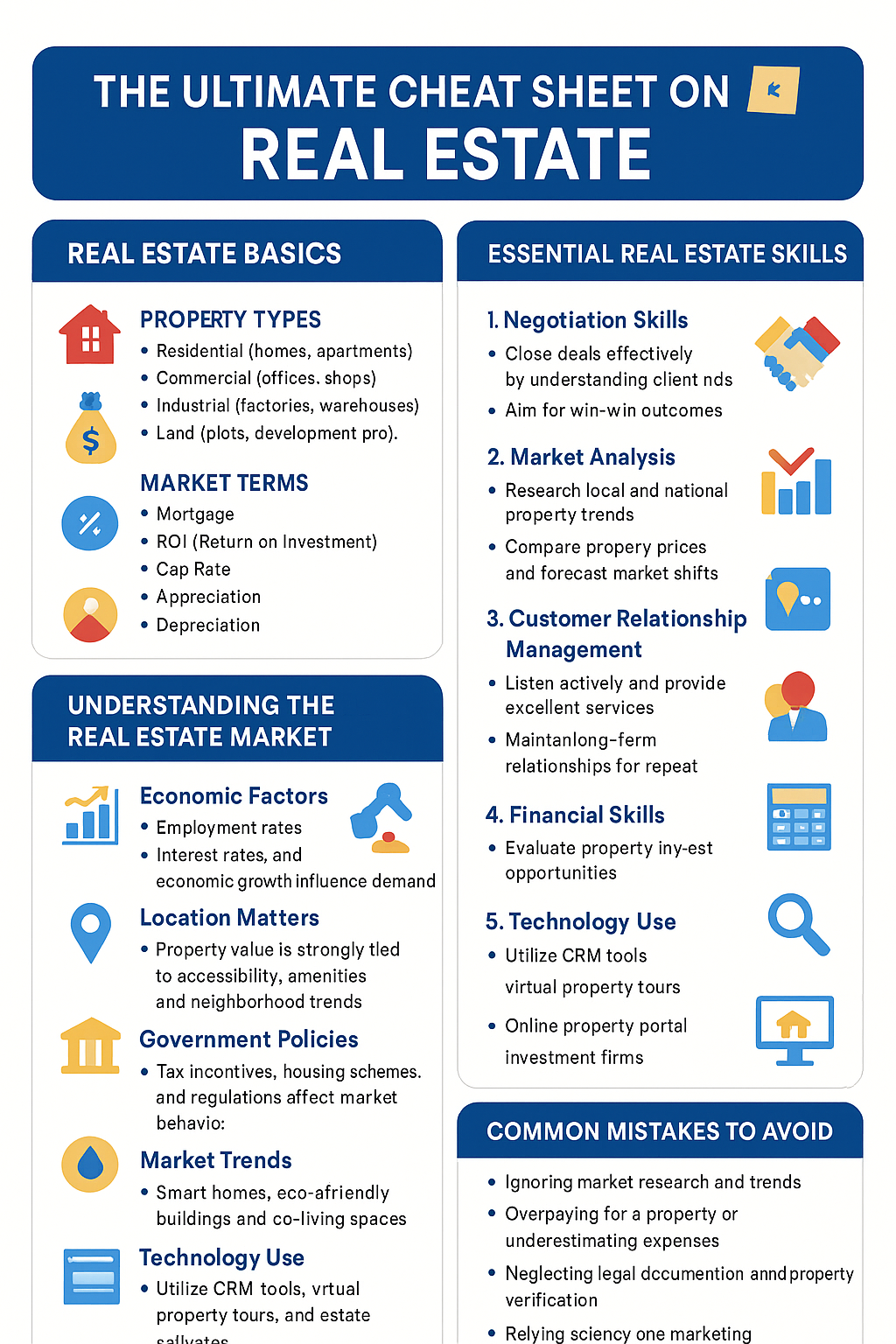Navigating the real estate market can be overwhelming, whether you’re a first-time homebuyer, an investor, or an aspiring real estate professional. From understanding market trends to mastering essential skills, this cheat sheet covers everything you need to succeed in real estate.
1. Real Estate Basics
Before diving into buying, selling, or investing, it’s important to understand the fundamentals:
Property Types: Residential (homes, apartments), Commercial (offices, shops), Industrial (factories, warehouses), Land (plots, development projects)
Market Terms: Mortgage, ROI (Return on Investment), Cap Rate, Appreciation, Depreciation
Key Players: Real estate agents, brokers, investors, developers, property managers
 2. Essential Real Estate Skills
2. Essential Real Estate Skills
Success in real estate relies on developing a set of core skills:
Negotiation Skills
Close deals effectively by understanding client needs and property value
Aim for win-win outcomes
Market Analysis
Research local and national property trends
Compare property prices and forecast market shifts
Marketing & Branding
Promote listings through social media, websites, and virtual tours
Build a personal or company brand that attracts clients
Customer Relationship Management
Listen actively and provide excellent service
Maintain long-term relationships for repeat business and referrals
Financial Skills
Evaluate property investment opportunities
Calculate ROI, manage mortgages, and analyze budgets
Legal Knowledge
Understand property laws, contracts, and regulations
Ensure smooth and legally compliant transactions
Technology Use
Utilize CRM tools, virtual property tours, and property listing platforms
Leverage digital marketing and lead generation software
3. Understanding the Real Estate Market
A deep understanding of the market helps you make informed decisions:
Economic Factors: Employment rates, interest rates, and economic growth influence demand
Location Matters: Property value is strongly tied to accessibility, amenities, and neighborhood trends
Government Policies: Tax incentives, housing schemes, and regulations affect market behavior
Market Trends: Smart homes, eco-friendly buildings, and co-living spaces are shaping the modern market
Tip: Always analyze the supply and demand dynamics and keep up with local property trends.
4. Competitor Analysis in Real Estate
Knowing your competitors gives you a strategic advantage:
Types of Competitors: Local agents, real estate agencies, online property portals, and investment firms
Competitive Analysis: Examine their listings, pricing, marketing strategies, and client reviews
Opportunities: Identify gaps in the market to provide better services or unique offerings
Pro Strategy: Focus on niche markets or specialized property types to stand out.
5. Investment Tips & Tricks
For those looking to invest in real estate, here’s a quick guide:
Buy in growing areas with strong infrastructure and amenities
Consider long-term rental potential for consistent income
Diversify your property portfolio across residential, commercial, and land assets
Always calculate ROI and assess market risks before investing
6. Common Mistakes to Avoid
Ignoring market research and trends
Overpaying for a property or underestimating expenses
Neglecting legal documentation and property verification
Relying solely on one marketing or sales strategy
7. Final Thoughts
The real estate industry is challenging yet rewarding. By mastering the basics, developing essential skills, understanding market dynamics, analyzing competitors, and making smart investment decisions, anyone can succeed in this field. Keep learning, stay updated, and approach every opportunity strategically.

 2. Essential Real Estate Skills
2. Essential Real Estate Skills


Join The Discussion